In January I received an email from out of the blue. Although I recognized the name, I couldn’t believe my eyes. It was from a man I’ve never met, but admire immensely.
“Thank you for your words of appreciation about the photographs,
and for what you have written here about Sarajevo.”
–Christian Maréchal
I was gobsmacked – and thrilled. He was referring to my post Indomitable: The Kids of Sarajevo, written after we returned from Bosnia and Herzegovina. What you may not know is that Christian Maréchal helped me bring the story to life.
I wanted to write about the incredible spirit of the children who survived the 1,425-day Siege of Sarajevo; I had the words, but no photos from the war. So I headed to my favorite source for fascinating photography, Wikimedia Commons, an online repository of free-use images. That’s where I discovered the powerful moments captured by Christian’s keen eye. Although I was unfamiliar with his work, I was amazed by his talent. I used four of his compelling photos of Sarajevo’s children to tell the story.
It turns out that Christian is a former London Ad Executive who decided to change his life. We’ve all read about top-level folks who ditch the rat race, quit their lucrative jobs, and trade their high-profile lives for anonymity in parts unknown. But not Christian.
He headed to war-torn Sarajevo to become a photojournalist documenting the Bosnian War, placing himself in snipers’ sights to capture amazing images that would bring attention to the conflict. It’s been said that being in advertising is like constantly dodging bullets: Christian took that saying to a new level. In his 2010 photo exhibit in Monterey, California, the caption on this photo says it all.
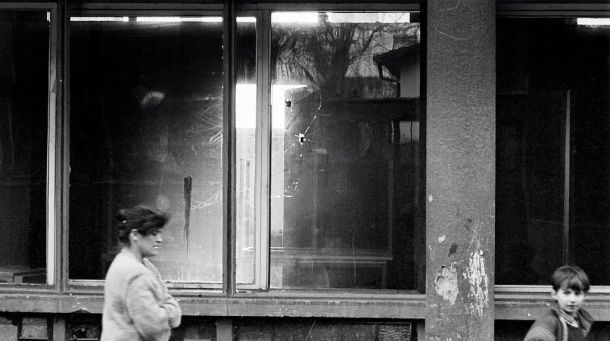
I opened a dialog with Christian and he told me the backstory behind each of the photographs I’d used in the post, providing a rare, firsthand account of life under siege. Here are his words.
“The children created the snow shot. I was walking a street, they were playing in the snow, and when they saw my camera they spontaneously grouped together for a photograph. I’d seen two adults on their way to collect water, the woman pulling the a sled to transport the containers; but then I focused my attention on the children for the photograph. It was only much later, when I looked at the first print, that I saw the adults had walked into the shot. They were tense because after a few more yards they’d have to cross an intersection where they’d be exposed to snipers. I don’t know what happened to the children in the pictures you have chosen.” –Christian Maréchal
Most of Christian’s photographs are in stark black and white, heightening the tension and bringing the message home, but in the next photo he chose color.
“The shot of the children playing in the wreck of the little Zastava 850 car: A slightly warmer than usual day, and they’re safe from snipers in this street. The sunlit cross street behind them (car with striped tarp) is more dangerous, and if they want to cross it they’ll have to run. Some enterprising residents, if they could afford the low-grade black market gasoline, occasionally ran electricity in their homes from the engines of their cars in the street, running the cable in through a window; enough to power some lights. Electricity was usually cut during this bitter winter. Water also. The first time I washed my hair in a friend’s apartment there, the water (it had been fetched from across town and perilously carried home by hand, often under sniper fire, in whatever containers could be mustered) was so shockingly cold I passed out.”
–Christian Maréchal
And if you’re like me, you’re curious about the two boys with the dog.
“The one in the hat was shy and didn’t want his picture taken; his uninhibited older brother was keen to get himself on film. They argued briefly about it and although the older brother got his own way the younger couldn’t quite bring himself to look into the lens—which is what makes the shot, I think. They were such sweet kids, these two, so natural, and their circumstances so brutal.
They were proud of their dog. It was in good shape and obviously getting fed. (For how much longer, I never knew.) Strays roamed the streets, sometimes in packs, their owners either dead or gone from the city or simply no longer able to feed them. The starving street dogs were said to be dangerous because the ones that had dined on corpses had acquired a taste for human blood. The children (not these two) sometimes asked for cigarettes in exchange for having their photograph taken. They could sell or barter them. I always carried packs of Marlboro to smooth the way through checkpoints. Everywhere I went the men all smoked like crazy.”
–Christian Maréchal
* * *
Finally, I want to thank Christian Maréchal, and all other photographers, who share their photos on Wikimedia Commons so that people like me can use them to tell a story. My words might have fallen flat without this talented assistance.
Christian has several other Sarajevo Siege photos on Wikimedia Commons; this excellent interview with Walter Ryce provides more of his backstory.
And lastly, one final photo that will leave you smiling.
Peace and Tolerance,
Terri
Last Updated September 5, 2023
“American John Jordan (right), a hero of the siege, was a Bristol, Rhode Island, volunteer fireman who took it on himself to equip the Sarajevo fire brigade with everything from boots to fire trucks that he shipped to Sarajevo from Europe and the USA. He divided his time between fund-raising in America and fighting fires with the Sarajevo brigade, whose work was made additionally hazardous by Serb snipers. Here he waits to board a C130 at the airport.”
–Christian Maréchal
Photo Credits: All photos by Christian Maréchal via Wikimedia Commons
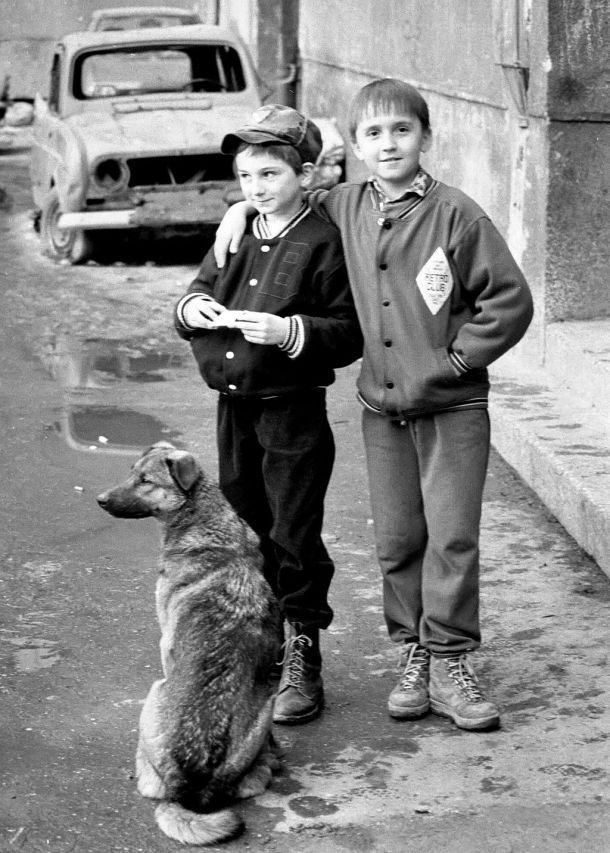
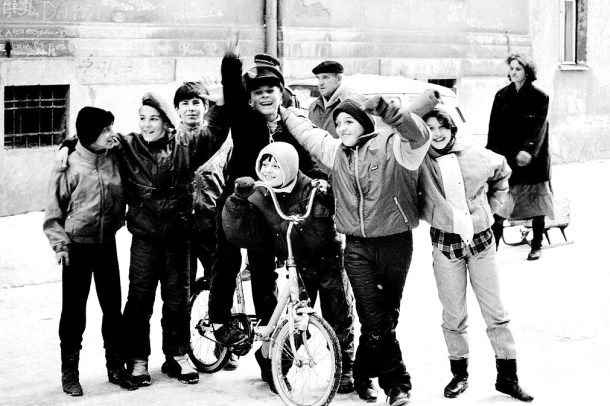
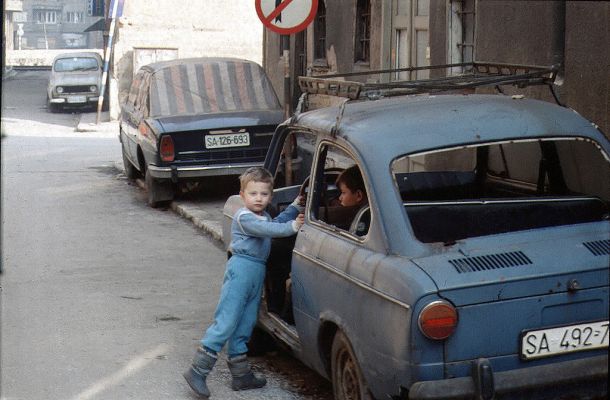
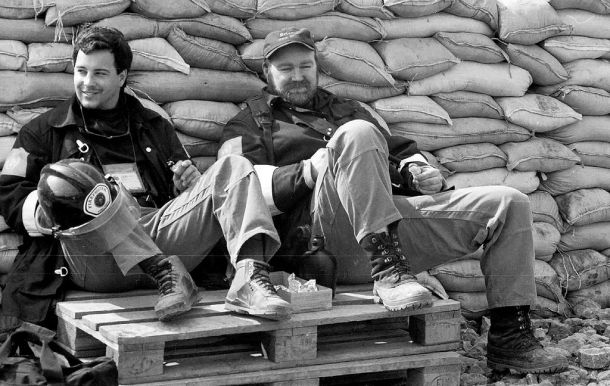
This is such a fabulous post. Congratulations on the recognition from Christian but perhaps more so on your ability to share such a compelling narrative. Being able to read the photographer’s explanation of the photos you chose is priceless.
Thanks so much Sue for your kind words. When I started communicating with Christian I was so fascinated by the stories behind the photos that I asked if he was willing to share any other “backstories.” He came back with such incredible detail. ~Terri
Just fabulous. I got a lump in my throat reading the descriptions imagining what it must have been like to witness it all, let alone live it.
wow; taking a quick break from painting, i was magically and unexpectedly transported to another world, one that touched me deeply. equally magical was the artful way you stitched past and present into a beautiful tapestry. may this sober all of us so that each day we strive to be the best we can be by putting others first with unselfish and genuine love for our fellow man.
________________________________
So good to see you Lisa, and thanks for your encouraging words. I didn’t know enough about the Bosnian War, and when we visited Sarajevo it was a crash course and good reminder of past events … reflected in the eyes of the young adults. Your thoughts on putting others first makes me smile every time I read it. 🙂 All the best, Terri
Great post………
Thanks so much! ~Terri
Wow, Terri.
What an amazing story (behind your story).
Thanks for sharing.
We, who live so far on the other side of the world, have really no idea of the impact of the Bosnian War.
I only knew I had travelled through parts of what was then, Yugoslavia & Bulgiaria, in 1976. I knew some of the towns and countryside first hand that were involved.
Thank you Vicki. Like you, we really couldn’t appreciate the true impact of the Bosnian War until we traveled there. What a trip that must have been through that part of the world in the 1970s. Do you have photos of that trip, or a post about it? That would be fascinating. Great to see you, hope you’re doing well. All the best, Terri
Such a compelling piece, it changes the “news” into a personal tale with bitter sweet details.
Many thanks. I knew when I first saw Christian’s photos that they were the perfect images to help me tell the story. His “backstories” brought it all to life. So glad you stopped by. ~Terri
Such an incredible story. As we all sit comfortably at our computers reading this, we should reflect on how lucky we all are, all of the things we take for granted on a daily basis. Christian’s words add so much.
What a great point you make Laura. And you, as a great photographer, appreciate what it takes to capture photos that have an impact. Add on top of that the fear of snipers for both the kids and the photographer … wow! And I totally agree with you about the things we take for granted on a daily basis. ~Terri
Thank you. I needed a story like this this morning. And I must admit, I’m almost more touched by the store of the fireman than I am the photographer….a sequel? It’s amazing how ‘dated’ these photos look now, without the filters and technology we have today, isn’t it? Which makes them all the more special. Great post.
Thanks Dina. Glad I could launch your morning. When I started communicating with Christian we remarked how the photos could have almost been from the 1950s in the USA or UK – without the snipers, of course. And the John Jordan story is fabulous. There’s a great feature on him on youtube – it’s quite a story and there’s a lot of live footage you might find interesting. ~Terri
What a great post! First, I had no idea there was even a site called Wikimedia Commons — looking that one up right now. Second, I love the pictures and the commentary. So very touching. So very real. You’ve made my day with this one!
Many thanks Rusha. I was so thrilled that Christian shared the stories behind the photos. I love Wikimedia Commons – it’s affiliated with Wikipedia, and is the perfect source when you have a story, but no photos to enhance it. I think you’ll love it – and I always learn so much from it.
Informative and brilliant post. Bringing to us the very real world of others from a perspective that we would otherwise never be exposed to.
Andrea, I’m so glad you liked it. Visiting Sarajevo was a real eye-opener for us, and Christian’s photos brought the recent past to life. Thanks for stopping by. ~Terri
Thanks Terri for bringing Christian’s work to life and writing such a touching post about his story. Those who put themselves in harm’s way to share the heartache of others are so courageous and selfless. Beautifully written piece.
Thanks LuAnn. It’s interesting how the this series of posts came together. I was so surprised and happy to hear from Christian, and his followup comments were wonderful. There are lots of blog posts out there, but these types of stories need to be heard by everyone. I’m happy to be able to bring Christian and his work to the attention of our readers. ~Terri
So glad you did!
Cute.
Hi Ron. I told Christian that the photos looked like they could have been taken in the 1950s in the USA or UK – without the threat of snipers, of course. It’s interesting how the black and white treatment emphasizes both the innocence and peril of the situation. Thanks for stopping by. All the best, Terri
What a fabulous story. I reported from Bosnia just after the war for a BBC radio programme, Our interpreter had survived the siege of Sarajevo and told us first hand stories of hunger and horror. It’s difficult to believe such atrocities took place on our doorstep.
Thanks HH. I know that you’re a journalist and I’ve always wondered about the topics of your reporting, but I never imagined Bosnia. That must have been fascinating and sobering on so many levels. I’ve read many of the survivor tales, and when I published the first post, several survivors sent me emails with their stories. We lived in Khartoum for several years, and the refugees there had amazing stories – such a poignant reminder of the brutalities of war. I’m so glad you stopped by. Are you continuing your extended gap year? All the best, Terri
I loved the initial post about this, but now with the added context from the generous photographer, it really brings the troubles to life. I admire those brave souls that venture to war torn, or famine ravaged, political hot beds etc, to tell the world about plights most of us would rather ignore, and to our shame, most of us would rather forget.
Good on you, Terri, for highlighting the work of two such ‘heroes,’ the photographer and the incredible firefighter.
Thanks Steve. It’s impossible to travel in this part of the world and not be moved by the scars left from the war. We came away from both Mostar and Sarajevo with an entirely different view of this appallingly sad episode of human history. It’s easy to view on TV from the other side of the world, but seeing it firsthand is a grim reminder indeed. ~Terri
Your follow-up post and photos were even more powerful and moving than your first write-up. Great writing and a wonderful human interest story! Thanks so much for sharing this. Anita
Many thanks Anita. Christian’s words and memories add so much to his already-powerful photos. It was such a heart-warming surprise to hear from him. His other Sarajevo photos are also excellent. ~Terri
Loved your amazing story and the very moving pics which you have shared. I especially love that last photo. John Jordan is certainly a hero. Bless him for doing such a sterling job. The world need more men like him.
Thank you Sylvia. I wasn’t aware of John Jordan’s heroic actions until I saw this photo, then I looked him up. Wow – amazing. There’s a feature on him on youtube that is excellent and worth checking out. From fighting fires under sniper fire to rescuing children in collapsed buildings, John and his team will restore your faith in humanity. So glad you stopped by. All the best, Terri
Thanks, Terri. I’ll check it out for sure.
What a touching bringing-together of people to tell a story. So glad he took the trouble to email you.
Thanks Bronwyn, I was so surprised. In his first email he told me the story behind the group of boys – I thought it was amazing that the adults had walked into the shot and he knew why they were looking so stressed. He has some other great photos of people hauling water, in every container imaginable, on kids’ sleds. ~Terri
These are the true heroes of our times. NOT the sports celebrities that “talking heads” on various television shows call “heroes”. These are the noble beings who restore our faith in mankind, and want to make us a better person.
I truly agree with you Virginia. And I’m sure there are so many unsung heroes who performed heroic actions every day to keep their loved ones (and strangers) safe. I love your term “noble” – you totally nailed it. ~Terri
That’s amazing. Thanks for sharing.
Thanks Carol. I too was so amazed by all the tales behind the photos – the story “behind the story” is always the best. So glad you stopped by. ~Terri
This has taken my breath a bit, seeing these photos from that time. I met and married my mad (late) husband there. A Brit working for the International Committee for the Red Cross and I was with the UN. The scenes are so familiar. Such a time. At once tragic, and terrible and yet — it felt like the center of the universe. Hard to explain. Thanks for making these connections. You two are really fantastic ‘travelers’ in the truest sense of the word.
Tricia, I am so touched by your kind words and bittersweet memories. Your sentence, “Such a time. At once tragic, and terrible and yet — it felt like the center of the universe.” is amazing! Events such as the ones you experienced always do stay with you – I know I feel that way about our time in Sudan during the Coup. I’m sure your stories from that time are equally as fascinating. So glad you stopped by. All the best, Terri
That is really cool to get the story behind those powerful photos.
I think these photos and the stories tell how strange we are – the photographer risked his life for these photos and yet cowardly snipers in the hills shot at innocent women and children. Humans have great power for good and evil and this post sums that up.
What a great point you make Jeff. One of the stories I didn’t include because it was just too heartbreaking, involved a child losing both of his parents to sniper fire as they stood in line for water. I could hardly fathom the sadness. I agree – cowardly. Thank goodness for people like John Jordan. ~Terri
I remember the original. So glad you got this response.
Thanks Jo. It was such a great surprise. By the way, I loved your post on Glasgow! ~Terri
Cheers, Terri I responded to your nice comment this morning 🙂
Terri & James, your post reminds us why blogging can be so enjoyable – it’s the connections that develop along the way that otherwise wouldn’t have happened. Having travelled through Bosnia-Herzegovina and others countries in the region, I especially enjoyed this post. Here’s hoping that photographer storytellers like Christian will help to ensure that history doesn’t repeat itself.
You’re so right Tricia. The connections we all make can be so wonderfully surprising and informative. You and Shawn must experience it all the time. I really like your sentiment about photographer storytellers ensuring that history doesn’t repeat itself. Fingers crossed. ~Terri
This was a very touching post and gave me pause in my morning to remember how fortunate I am to simply live in safety. I salute the courage and compassion of people like Christian … and you … who bring these first hand accounts to our attention.
Many thanks Joanne. That’s amazing that you mentioned how fortunate we are to live in safety because James and I were just talking about the same concept this morning. And that we have ready access to potable water, electricity – all these things we so easily take for granted. Thanks again for your kind words. ~Terri
Terri, what a wonderful gift to get the stories behind these pictures from the photojournalist himself. I’m so glad you shared this story, and the one that inspired it.
I was so thrilled Anita. I said to James, “You won’t believe who sent us an email,” … and he couldn’t. Then when we learned the stories behind the photos, we knew we had to share. 🙂 ~Terri
Wonderful photographs and such interesting stories to go with them.
Thank you Marie. I was so glad that Christian shared the “backstories” for his photos – it really brings them to life. ~Terri
This story reminds me how your blog has impacted us. Your Bosnia and Herzegovina story influenced us to visit there last year while we were living in Croatia. As beautiful as the country was, we felt the burden of a ‘prolonged sadness’ emanating from the country. However, we also experienced an openness and warmth from perfect strangers who were delighted we chose to visit their country.
We hired guides on a couple of occasions to take us places we would never have discovered on our own. Our trip faded into memories until one recent day, out of the blue, the young lady who toured us through both Srebrenica and Sarajevo sent us an email saying simply, ‘I’m glad to have met you and I will never forget you.’ How sweet is that! That small gesture will stay with us forever. – Mike
Mike, your description of Bosnia emanating a “prolonged sadness” is so perfect. We felt the same thing, and we also detected an air of hopefulness in the young adults. That was encouraging.
It’s so wonderful that you heard from your former guide. You and Florence obviously made quite an impression on her. Isn’t it great to make those kinds of connections? We’ve always felt that those kinds of personal connections make all the difference. So glad that you’re enjoying your calm spring before things start getting active around Easter. Here in the Southern US it’s Spring Break time and things can be pretty wacky! 🙂 ~Terri
Fabulous post. These were the worst of times, but also strangely sometimes the best of times. We often visit the region and the consequences of the war are never far away, but at the same time it is remarkable how far things have moved on.
Thank you so much. We spoke with some other survivors and they made a similar observation about the “worst and best of times.” Were you living in the area at that time? ~Terri
Yes, I lived in the region during and after the conflict. The friends you make then are the friends you keep.
Great story Terri!!! Thanx for sharing … Those pictures and captions are so touching … got goosebumps reading through …
Many thanks! When I saw Christian’s photos they knocked my socks off. I knew they were perfect for telling the story. So glad you stopped by. All the best, Terri
This post is just beautiful, as is the original that prompted the photographers response. The photos are stunning, but the explanations provided really add to their poignancy! You’re right, it’s hard not to look at these and not wonder what became of each of them! Such a sad story, Sarajevo is… despite the human spirit, and the ability of people to still survive and carry on, it’s shocking that a city that once hosted the Olympics, became something so perilous, and lost. Thanks for sharing this follow-up to your original story; it’s truly wonderful!
Thanks so much Dawn. I too was stunned by the devastation Sarajevo sustained during the war and didn’t know what to expect when talking with the people. The young adults were a joy – a combination of youthful sarcasm mixed with optimism. I was pleased to discover Christian’s photos – then thrilled when he told the stories behind them. His words really brought them to life. Thanks again for your encouragement. So glad you stopped by. All the best, Terri
Have you ever thought of writing a book about Bosnia? I think you’d do a great job writing one! I would totally read it. Great post and photographs!
https://lifeismuyfantastico.wordpress.com/
Thanks for your very kind words Zachary. I think Christian Marechal would be the perfect author for that project. What an experience that must have been. So glad you stopped by. All the best, Terri
Terri: This post and its pre-curser are heart breaking, yet beautifully inspiring. The power of your words and the honesty of his images threaded together as a wonderful example of our connectedness in this world. Love your blog. Feel honored that you stopped by mine. 🙂 Best, Bailey
Bailey, Thanks so much for your very kind words. Traveling in Bosnia was a real dose of reality for us – particularly the parks-turned-into-cemeteries to hold the bodies of so many young people. Truly heart breaking. But the spirit of the young adults is strong and a joy to see, and Christian’s photos are superb. So glad you liked the post. 🙂 ~Terri
Hey – great shout out being freshly pressed – again! Congrats.
It’s so important that those bleak days that turned to years in Sarajevo – never is forgotten. I often wonder about people I knew there then. Always close to my heart.
Thank you so much, Tricia. James and I were just talking about you this morning, wondering about your time in Yugoslavia. It must have been horrendous from all accounts I’ve read. What was your role? Have you written about it? If so. please steer me to some of your posts. Thanks! ~Terri
Jill, you are SO kind. Thanks for the generous link to our post. I love that you said we “describe humanity at its best: indomitable in the face of horror.” We truly appreciate the shout-out. ~Terri & James
I am now in tears. My heart feels heavy for the children. One can only wonder what happened to them.
Beautiful post and congratulations on being Freshly Pressed!
Thanks so much Monica for your very generous and kind words. When I first saw Christian’s photos of the children I felt the same way … as I do for all children who are victims of war. I was glad to discover that some of the survivors are now making their way in the world and will hopefully spread the message of peace. So glad you stopped by. 🙂 All the best, Terri
Hi Terri
I am so happy to have found you, your wonderful work and finally a link to Christian who was a dear friend in London for many years but who I sadly lost touch with when he moved abroad. I have tried to find him many times without success. Can you put us in touch? I would be so grateful. Best wishes
Hi Nellie,
It’s very nice to meet you. I bet it was a joy working with Christian – what a talented man. My last contact with him was in 2014 and he was living in California, USA. His email address was writegeist@gmail.com.
I hope this is helpful and you’re able to reconnect.
All the Best, Terri
your piece is very elaborate and descriptive together with the pictures… it,s like I have also been to the place…
Sami, thanks for the comment and for dropping by the blog. Our trip to Sarajevo was a real eye-opener for us and we were glad to be able to publish a post on the realities of the terrible war in Bosnia. It’s not a pleasant topic, but we felt it was one that our readers needed to see. ~James